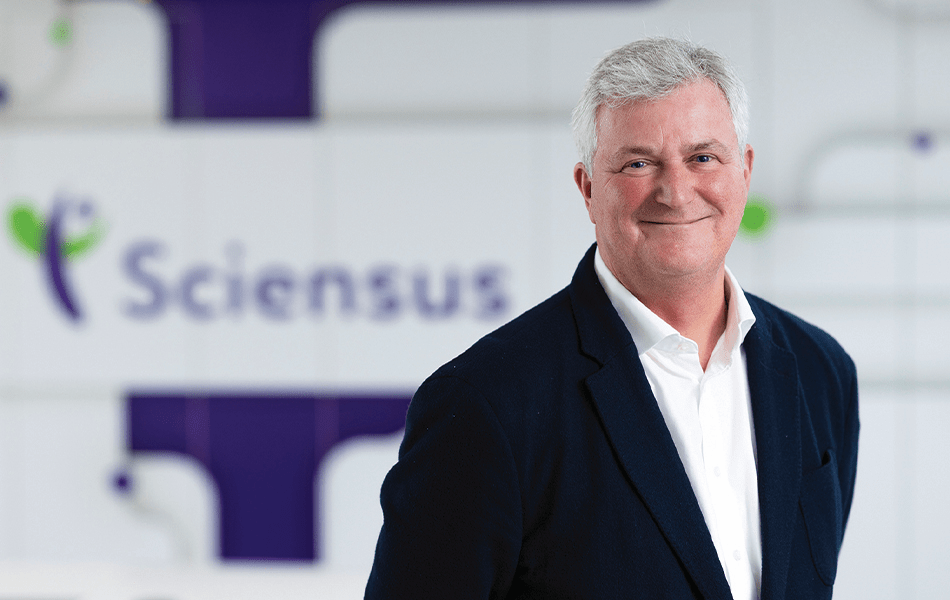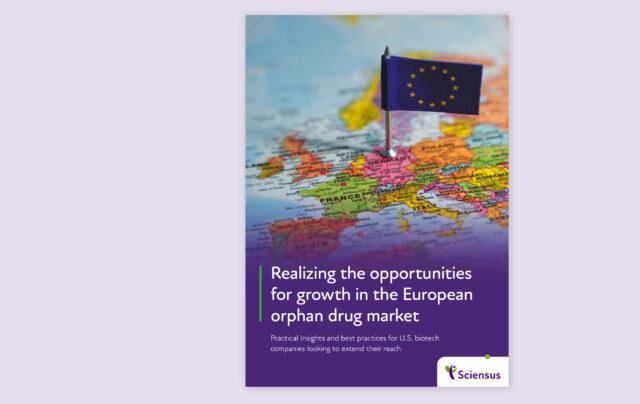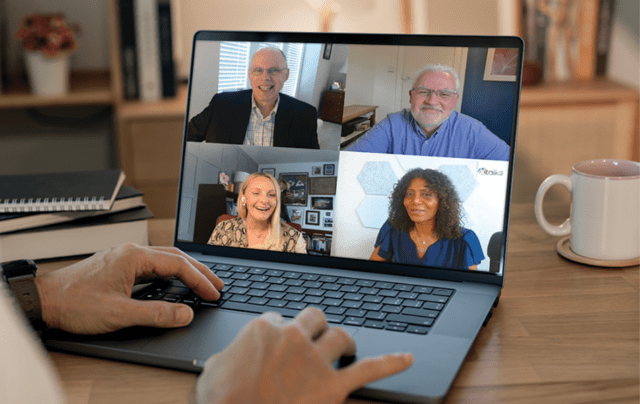
Breaking into Europe: insights for biotech leaders
Authors: Mathieu Loiseau, Director of Rare Clinical Services; Andrew Cummins, Vice President, Business Development; Alastair MacDonald, Head of Medical Affairs and Growth Strategy; and Ray Huml, Vice President, Rare Disease Strategy
Expanding into Europe comes with unique challenges – diverse regulations, cultural nuances and significant risks. The Sciensus team recently shared their perspectives on the practical realities of launching new treatments into European markets, possible strategies for success and the importance of local collaboration and patient engagement.
Key takeaways
Companies launching into Europe must navigate a diversity of languages, cultures and regulations that vary not only across European Union member states but also in countries outside the EU. This complexity creates challenges for market access, local expertise requirements and the need to align with a broad range of healthcare system demands.
At a practical level, companies may need to develop different packaging configurations, patient information and labelling, as well as country-specific pricing strategies. The time and effort required to address these issues should not be underestimated, underlining the value of local knowledge. Local partners can help manage supply chains and distribution while ensuring all necessary quality, safety and regulatory processes are in place.

US biotechs face several key challenges in Europe
Companies launching into Europe must navigate a diversity of languages, cultures and regulations that vary not only across European Union member states but also in countries outside the EU. This complexity creates challenges for market access, local expertise requirements and the need to align with a broad range of healthcare system demands.
At a practical level, companies may need to develop different packaging configurations, patient information and labelling, as well as country-specific pricing strategies. The time and effort required to address these issues should not be underestimated, underlining the value of local knowledge. Local partners can help manage supply chains and distribution while ensuring all necessary quality, safety and regulatory processes are in place.

Strategies to navigate Europe’s complex landscape
Companies looking to launch in Europe first need to consider their long-term strategic ambition. For example, a company launching its first product into Europe should assess whether it plans further launches in future. If so, building its own European footprint may make sense. If not, the costs and commitments may be prohibitive – especially if multiple countries are to be covered.
An alternative approach could be to out-license, although this means sacrificing a high level of control. While out-licensing can deliver upfront payments and royalties, companies should think carefully about the true value of what they may be giving away in an unfamiliar market. A third option is to partner with an experienced service provider that has a track record of bringing new products to Europe – and to benefit from their local expertise and infrastructure.

How collaboration drives successful launches
One of the most important success factors is being patient centric and working with organisations that help navigate Europe’s complexity. Ideally, biotechs should choose partners who can engage with local patient groups and advocacy communities, which can be challenging where networks are small and language barriers exist.

Companies can also develop patient support programmes (PSPs) – for example, in-home nursing or digital solutions that help people adhere to treatment plans. These programmes help build communities and improve patient access to new treatments. Local partners supporting such initiatives must have a strong understanding of the local healthcare landscape and how to make these programmes work in practice.
Local collaborations help companies understand what is and isn’t possible, how patients can get the best out of a product and how the patient voice can be integrated into launches.

PSPs are important not only in terms of the patients but to your company, as they have been demonstrated to increase adherence and persistency to the tune of 10–20%.”
Alastair MacDonald Head of Medical Affairs and Growth Strategy
How biotech companies can help overcome the obstacles patients face in accessing trials
One challenge when planning trials is ensuring people understand what participation involves – for example, the physical location, the length of the trial, how long each visit will take and the practical and financial impact on those taking part.
It’s important for companies and healthcare professionals to connect with patients and advocacy groups – by attending conferences, facilitating focus groups or sharing information openly – to ensure potential participants feel informed and supported.
“When you look at the pipeline design of drug development, you don’t really see advocacy groups in there very much, but we’re really important in that chain from going from nothing to a treatment programme.” Kathy Senecal – FSHD Society (facioscapulohumeral muscular dystrophy) New England Chapter director.

The importance of real-world data
In many therapy areas, there can be a limited volume of existing data, which affects the development of protocols and inclusion or exclusion criteria. Biotechs should aim to collect real-world data (RWD) as early as possible to meet the expectations of regulators, payers, healthcare professionals and patients.
Evidence around the burden of a condition, impacts on quality of life and costs to health systems and insurers is critical. Bridging evidence gaps with real-world data supports future clinical trial design and drives uptake among healthcare professionals and patients.
Engage early and plan wisely
A European launch is a high-cost exercise, so the economics must be sound – companies need to know whether reimbursement will cover the costs of launch and ongoing operations. Early engagement with EU and national regulators can help clarify these options.
Patient support programmes can be a smart investment – an uplift in adherence and persistence of 10–20% can deliver significant clinical and commercial value.
“Europe is a great opportunity. If you approach it in a non-traditional way you can set up your company for success.” Grant Castor – Senior VP, Commercial Strategy & Operations

About Sciensus
Sciensus is a trusted partner for biotech and pharma companies looking to enter Europe. With deep local expertise, a robust infrastructure and patient-first approach, we help companies navigate the European landscape – managing the complexity so you can focus on delivering life-changing treatments to the people who need them.
Read more on…

Thought Leadership
Expand into Europe: unlocking the orphan drug market

Thought Leadership
Key strategies for a successful European drug launch
We recently hosted a webinar focused on essential strategies for launching orphan drugs successfully in the European market. Our latest…

Thought Leadership
Commercialization of rare & orphan products in Switzerland and smaller EU Markets